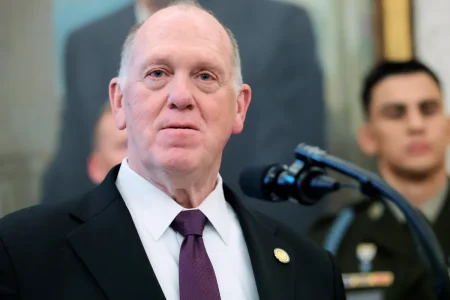New Mexico Governor Michelle Lujan Grisham has vehemently opposed President-elect Donald Trump’s plan to utilize the National Guard for mass deportations, arguing that such a policy would be devastating to families and the state’s economy. Governor Lujan Grisham’s stance underscores a growing tension between state and federal authorities over immigration enforcement, with several states signaling their resistance to Trump’s hardline approach. The governor emphasizes the potential for economic disruption caused by mass deportations, highlighting the contributions of immigrants to New Mexico’s workforce and the negative consequences of removing them. Furthermore, she raises concerns about diverting National Guard resources from critical state needs, such as disaster relief, to support federal immigration enforcement efforts.
Governor Lujan Grisham’s opposition is rooted in her belief that mass deportations are inhumane, disruptive, and economically damaging. She argues that such policies tear families apart and create instability within communities. The governor also questions the practicality and effectiveness of mass deportations, suggesting that they are a misallocation of resources that could be better used to address actual criminal activity. Instead, she advocates for a more targeted approach focusing on the deportation of convicted felons and individuals engaged in criminal activities. Lujan Grisham’s stance reflects a broader concern among critics of Trump’s immigration policies, who argue that they are overly punitive and fail to address the root causes of migration.
While firmly opposing mass deportations, Governor Lujan Grisham has expressed willingness to collaborate with the federal government on targeted enforcement efforts. She has indicated that New Mexico would welcome the assistance of additional federal agents to assist with investigations, interdictions, and deportations of individuals involved in criminal activities. This nuanced approach distinguishes her opposition to mass deportations from a blanket rejection of all immigration enforcement measures. Lujan Grisham’s position suggests a desire to strike a balance between upholding the rule of law and protecting the rights and well-being of immigrant communities.
The governor’s stance has been met with a starkly contrasting response from the Trump administration. Trump’s transition team has reiterated his commitment to carrying out the “largest deportation operation” in U.S. history, emphasizing a focus on removing criminals, drug dealers, and human traffickers. They argue that this approach is necessary to protect American families, lower costs, and strengthen the workforce. This stark difference in perspective highlights the deep divide between the incoming administration and those who oppose its immigration policies. The Trump administration views immigration primarily through a lens of national security and economic competition, while critics like Governor Lujan Grisham prioritize human rights and the economic contributions of immigrants.
The clash between New Mexico and the federal government over immigration policy reflects a broader national debate. Several other states with significant immigrant populations are also considering legal challenges to Trump’s proposed policies. This emerging resistance suggests that the implementation of Trump’s immigration agenda may face significant obstacles at the state level. The legal battles that are likely to ensue could have far-reaching consequences for the future of immigration enforcement in the United States. The outcome of these challenges could determine the extent to which states can exert their authority to protect immigrant communities from federal policies they deem harmful.
Beyond the immediate policy disagreements, the conflict over immigration also reflects a deeper philosophical divide. Governor Lujan Grisham has called for more respectful rhetoric when discussing immigrants, urging both the President-elect and the American public to recognize their humanity and contributions to society. This plea for empathy underscores the human dimension of the immigration debate, often obscured by political rhetoric and policy disputes. The clash over immigration is not merely a legal or political battle; it is a fundamental disagreement about values, identity, and the future of American society. The outcome of this conflict will have profound implications for the lives of millions of immigrants and the character of the nation as a whole.















